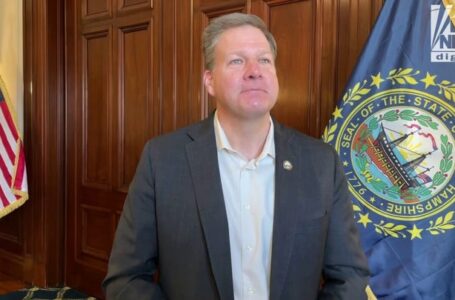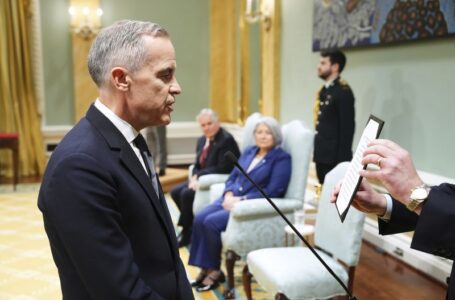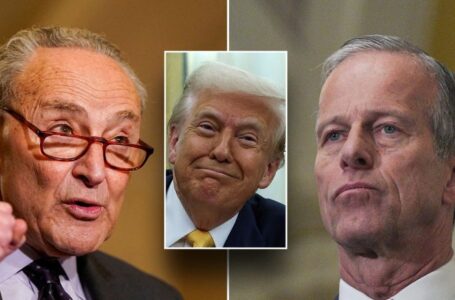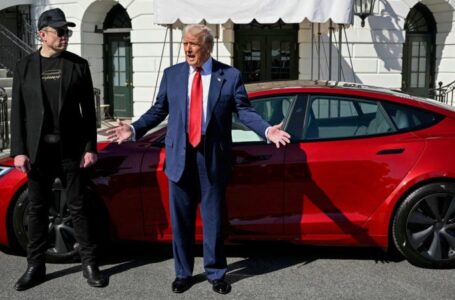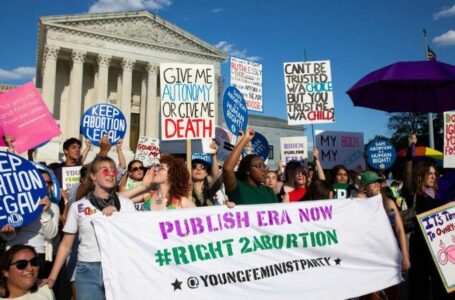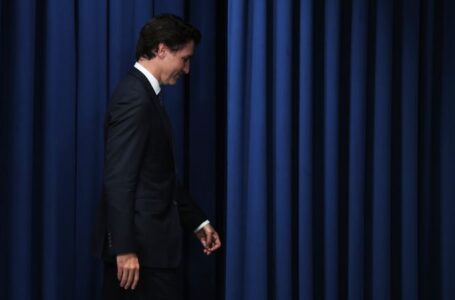Anna Paulina Luna escalates DOJ standoff over Epstein docs, unveils SHRED Act
Trump defeats Haley in South Carolina primary, extending sweep of early states
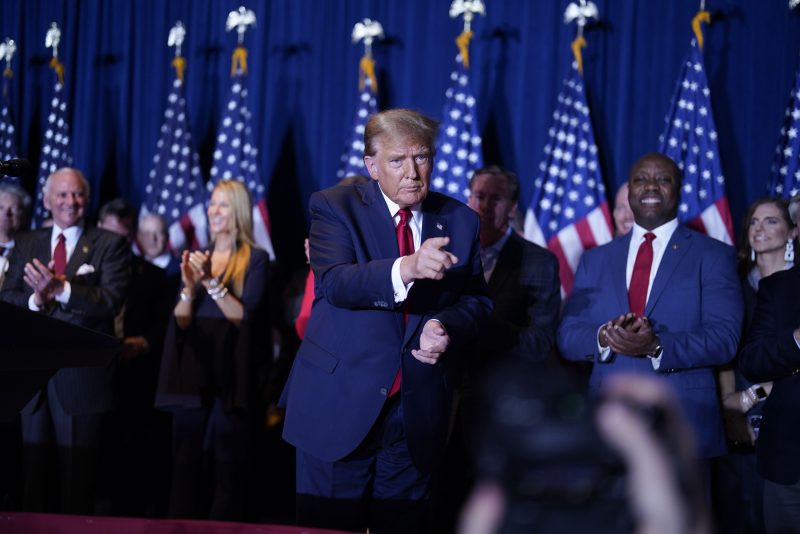

COLUMBIA, S.C. — Donald Trump extended his sweep of the early Republican primary contests with a decisive victory in South Carolina on Saturday, soundly defeating the state’s former two-term governor, Nikki Haley, as he marches to the Republican nomination.
The Associated Press projected Trump as the winner just after polls closed. The victory marked another successful early-state performance by Trump, who many in the party are treating as the presumptive nominee. It was a blow to Haley, who had outspent and outworked Trump in the state. And it marked her fourth major state loss in a row, leaving some close to her pessimistic on her path forward, even as she vowed to keep running.
Trump spoke three minutes after the polls were closed Saturday, long before he usually does, and the small room at the state’s fairground was still half-empty. He was frustrated in New Hampshire when Haley came out before him and declared the evening a success, and was determined not to let her have the first word again, advisers said.
“I have never seen the Republican Party so unified as it is right now,” Trump said, in an implied dig at Haley. Looking toward the November election, Trump added, “I just wish we could do it quicker.” He did not mention Haley directly.
With about 63 percent of the vote tallied, Trump led with about 61 percent of the vote, well ahead of Haley, at about 39 percent. Haley made a point of noting her total in a speech where she vowed to keep pressing forward.
“I know 40 percent is not 50 percent, but I also know 40 percent is not some tiny group,” Haley said Saturday night, as her supporters responded by chanting her name. They booed when she congratulated Trump on his victory.
“There are huge numbers of voters in our Republican primaries who are saying they want an alternative,” Haley went on. “I’m not giving up this fight when a majority of Americans disapprove of both Donald Trump and Joe Biden.”
Trump’s win was fueled by deep support among evangelical and rural voters, as well as the party’s elected officials uniformly lining up behind him. In a show of force, they flanked the stage with him Saturday night.
Despite a reputation for having a tendency toward down-and-dirty political fights, the South Carolina primary this year was unusually sleepy, with no viral ads or explosive revelations. Haley’s campaign and allied super PAC outspent Trump’s campaign in the state by about $15 million to $1 million, according to media tracking data from AdImpact.
Almost all of the state’s elected leaders — including the governor, both senators, five members of Congress and many other statewide elected officials — lined up early behind Trump and blanketed the state to help Trump, even as he was in the state far less than Haley.
Trump’s campaign emphasized outreach through pastors, often touting the former president’s record of appointing the Supreme Court justices who overturned the constitutional right to an abortion established in the 1973 case Roe v. Wade.
While many Republicans see Haley’s path to the nomination as all but closed, her campaign said it is planning to spend more than $1 million on ads across the 15 states that vote on March 5, known as Super Tuesday. Her team has planned visits to Michigan on Sunday and Monday, followed by visits to at least a half-dozen Super Tuesday states.
“Pressure for her to drop out grows after tonight,” Sen. Lindsey Graham (R-S.C.), a Trump supporter, said of Haley. “Republicans have made up their mind. It’s Trump. You can talk all you want. They aren’t listening anymore.”
Republican Gov. Henry McMaster, another Trump supporter, said he wouldn’t call for Haley to drop out Saturday night, but expected Trump to get “a big boost.”
Trump’s speech Saturday night was shorter and less energetic than his remarks in recent days. The most awkward moment of the evening came when the crowd loudly booed Graham, who Trump said was a “little to the left” of others onstage. Even as Trump continued to defend Graham, telling the crowd he loved him, they kept booing.
The crowd also booed Drew McKissick, chairman of the South Carolina GOP. Trump jokingly mocked Sen. Tim Scott (R-S.C.) for not campaigning well for himself in the Republican presidential race, saying Scott was better as a representative of Trump. But the crowd did not boo Scott.
Trump kept a light schedule in the final days of the race compared to Haley, who outpaced him with more than 40 events and flooded the airways with television ads. His team has tried to deprive Haley of attention, and several Trump advisers said they hoped to totally ignore her after Saturday.
Instead of campaigning in the state Saturday, Trump visited the Conservative Political Action Conference outside Washington, where he spoke for 90 minutes without once mentioning Haley. Instead, looking toward a general election rematch with President Biden, Trump framed the campaign in apocalyptic terms, warning of economic collapse, crime and terrorism.
“Our country is being destroyed, and the only thing standing between you and its obliteration is me,” he said. “In many ways, we’re living in hell right now.”
Trump further escalated his inflammatory attacks on his political opponents, calling them at turns “sickos,” “evil,” “Stalinist,” “executioners,” “thugs and tyrants, fascists, scoundrels and rogues.” As he has during his two previous campaigns, he told his supporters not to accept an electoral defeat, claiming without evidence that any loss would be illegitimate.
“Nov. 5 will be our new Liberation Day,” Trump said of this year’s election. “But for the liars and cheaters and fraudsters and censors and impostors who have commandeered our government, it will be their Judgment Day. … Success will be our revenge.”
More than 6 in 10 South Carolina GOP primary voters denied the legitimacy of Biden’s 2020 presidential election victory, according to preliminary exit polling. That’s similar to the share of Iowa caucusgoers who said Biden was not legitimately elected, but higher than the 51 percent who said the same in New Hampshire.
Nearly 4 in 10 Republican voters in the state said they most want a candidate for president who fights for them, while another third said they want a candidate who shares their values, according to early exit polling. Far fewer said it was most important that a candidate have the right temperament or have the ability to beat Biden.
Trump’s team is eager to shut down the primary and stamp out remaining pockets of dissent in the party, as it braces for a general election fight with Biden while navigating a thicket of legal issues. Trump faces 91 criminal charges across four indictments and has made frequent court appearances.
Republican National Committee Chair Ronna McDaniel has said she will step down after Saturday’s contest, clearing the way for Trump’s chosen successor, Michael Whatley of North Carolina. He will be joined by Trump’s daughter-in-law, Lara Trump, as co-chair.
On Saturday, an RNC member proposed restricting the party from paying the legal bills of any candidate and requiring the party to stay neutral until a candidate captures enough delegates to be the nominee — drawing a rebuke from Trump’s team.
“The primary is over and it is the RNC’s sole responsibility to defeat Joe Biden and win back the White House,” Trump adviser Chris LaCivita said. “Efforts to delay that assist Joe Biden in the destruction of our nation. Republicans cannot stand on the sidelines and allow this to happen.”
Haley on Saturday criticized the choice of a family member to run the RNC. “I think having a family member run it, or a campaign manager being a part of it, should not qualify, and I would hope that the people in the RNC know that they have a responsibility, a responsibility to put in people in the RNC who are going to look out for the best interest of all of the Republican Party, not just one person,” she told reporters in Kiawah Island.
She also called Trump’s remarks to a gala of Black conservatives on Friday “disgusting.” At the event, Trump compared his criminal charges to Black Americans’ experience of discrimination in the criminal justice system. “A lot of people said that’s why the Black people liked me, because they had been hurt so badly and discriminated against,” Trump said. He added that when his mug shot was released in the Fulton County, Ga., case accusing him of interfering in the 2020 election, Black people “embraced it more than anyone else.”
“That’s what happens when he goes off the teleprompter,” Haley said. “That’s the offensiveness that’s going to happen every day between now [and] the general election, which is why I continue to say Donald Trump cannot win a general election.”
Speaking in front of the USS Yorktown at Patriot’s Point in Charleston on Friday night, Haley delivered her final pitch to voters — focusing heavily on her record as governor and calling for a return to normalcy. She repeated her familiar argument that the majority of Americans don’t want a rematch between Trump and Biden, calling them “the two most disliked politicians in America” and pitching herself as the GOP candidate who could beat Biden in the general election.
“You need a leader that has moral clarity that knows the difference between right and wrong,” Haley said, pointing to Trump’s comments on NATO and accusing Trump of emboldening Russian President Vladimir Putin and “siding with a dictator who kills his political opponents.”
Haley campaign manager Betsy Ankney told reporters Friday that she has “infrastructure on the ground” in states like Georgia and Washington that vote after Super Tuesday “through the end of March.” The Trump campaign has projected that he could win enough pledged delegates to secure the nomination by the end of that month.
“In the next 10 days, another 21 states and territories will speak,” Haley said on Saturday. “They have the right to a real choice, not a Soviet-style election with only one candidate. And I have a duty to give them that choice.”
Wells reported from Charleston, S.C. Arnsdorf reported from Washington. Emily Guskin in Washington contributed to this report.


